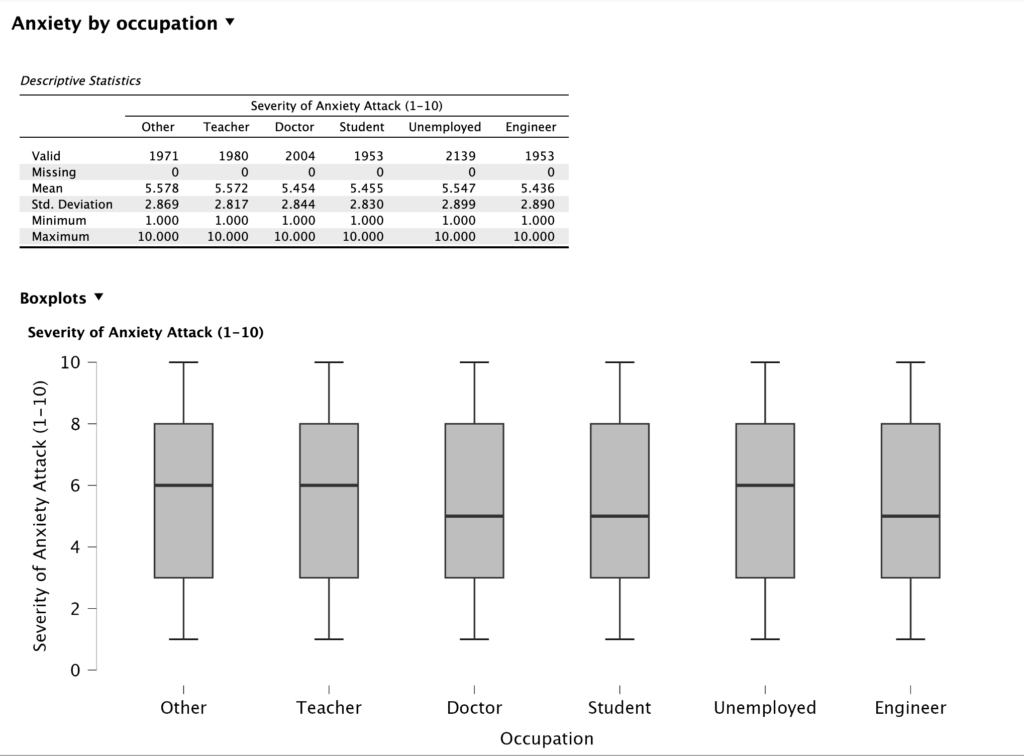Understanding Anxiety Severity Across Age and Occupations
Anxiety is a common challenge that affects individuals differently based on age, occupation, and lifestyle factors. Understanding these patterns is essential for finding effective strategies to manage and reduce stress. Let’s dive into the nuances of how anxiety impacts different age groups and professions, along with key insights on stress management.

Age and Anxiety Severity
Age is a significant factor when it comes to anxiety levels. Different life stages bring unique stressors, and the data sheds light on these trends:
- Young Adults (Ages 0-20): This group experiences a wide range of anxiety severity, but their average level is moderate. With school pressures, social expectations, and early career concerns, it’s no surprise that young adults often struggle to manage stress.
- Adults (Ages 21-40): This is the age where anxiety severity tends to peak. Life challenges such as work demands, relationships, and financial responsibilities contribute to heightened stress levels in this group.
- Middle-Aged Adults (Ages 41-60): Anxiety severity begins to stabilize in this stage. While individuals in this group still report moderate anxiety, many develop coping mechanisms and gain emotional resilience over time.
- Seniors (60+ years): Anxiety levels generally decline among seniors. With fewer career or familial stressors, this group often experiences lower anxiety severity compared to younger populations.
Occupations and Anxiety Severity

Your job can significantly influence your stress levels. Here’s how different professions stack up:
- Students: Anxiety severity averages 5.45 out of 10. Academic pressures, future uncertainty, and balancing personal life contribute to their stress.
- Teachers and Doctors: These professions share similar anxiety levels, averaging 5.45. The emotional demands of teaching and caregiving can elevate stress.
- Engineers: With an average anxiety severity of 5.43, engineers have slightly lower stress levels. Problem-solving-focused work may help them stay grounded.
- Unemployed Individuals: Anxiety severity is higher among the unemployed, averaging 5.55. Financial instability and lack of job security are key stressors in this group.
- Other Professions: Roles outside the traditional categories show the highest severity at 5.58. This indicates that certain job conditions may amplify anxiety.
Factors Influencing Stress Levels and Anxiety
Several lifestyle factors impact anxiety severity. Understanding these can help you make informed choices to improve mental well-being:
- Caffeine Intake: Consuming high levels of caffeine is associated with increased anxiety. While the correlation is weak, reducing caffeine can benefit individuals prone to anxiety symptoms.
- Sleep Hours: Although the connection between sleep and stress isn’t strong in this analysis, quality sleep remains vital for emotional health.
- Physical Activity: Exercise has a slight negative correlation with stress. Even small amounts of regular physical activity can reduce anxiety and improve overall mood.
- Therapy Sessions: Attending therapy sessions moderately correlates with lower stress levels, highlighting the importance of professional mental health support.
Gender Differences in Anxiety
The analysis also revealed slight differences in anxiety severity among genders:
- Females: Average severity is 5.47. Hormonal changes and societal pressures may contribute to higher anxiety levels.
- Males: Severity is slightly higher at 5.53. Workplace stress and social expectations can influence anxiety in men.
- Other Genders: Individuals identifying outside the traditional gender binary reported the highest severity at 5.59, suggesting unique challenges faced by this group.
Key Takeaways for Managing Anxiety
Understanding the patterns of anxiety across different age groups, occupations, and genders is crucial for targeted solutions. Here are some key takeaways:
- Stay Active: Regular physical activity is a proven way to lower anxiety and improve overall mental health.
- Limit Caffeine: Reducing caffeine intake can help prevent symptoms of anxiety from escalating.
- Seek Therapy: Professional mental health support is invaluable for those experiencing severe stress.
- Tailored Support: Gender differences in anxiety severity call for tailored approaches to provide better care for diverse groups.
At B-Fuel, we believe in fueling your body and mind to combat stress and live a balanced life. Whether you’re tackling academic pressure, workplace challenges, or personal life struggles, understanding your triggers and managing your habits can make a world of difference.

